5 Reasons You Should Not Sell a House When You Retire

Selling your home in retirement seems like it would net you a nice profit that you could live off in addition to your retirement savings.
However, many financial experts say selling your house is the last thing you should do when you retire.
Discover More: How Long $1 Million in Retirement Will Last in Every State
Find Out: The Surprising Way You Can Get Guaranteed Retirement Income for Life
“Sometimes, the only reason people consider selling their homes during retirement is because they think that is what everybody should be doing at retirement: downsizing their living space, to save cost,” Mafe Aclado, the general manager of Coupon Snake, said. “However, the truth is that selling your home isn’t a one-size-fits-all for everyone.”
Read on to find out what could go wrong if you sell off what is likely your most valuable asset:
Retirement Planning: Whether you're planning for retirement, dealing with a significant life event or simply looking to make smarter financial decisions, a financial advisor can offer the expertise and guidance you need. Here are some compelling reasons why you should consider a financial advisor -- even if you're not wealthy.
High Selling Costs
Selling a home isn’t without expense. You have to pay a realtor and transaction fees. David Brillant, an estate planning attorney at Brillant Law, said those transaction fees are not cheap.
“Transaction costs to sell a home are significant. [They’re] often 5-6% of the sale price in commissions and closing costs.” Brillant said.
Aclado said the costs don’t end at transaction fees.
“Selling your home means repairs, staging and major maintenance, especially if you plan to get a good deal for the home. It also means real estate commission, because there are those aspects of the transaction you simply might not have the expertise to handle on your own. There is also the cost of moving to a new house; moving trucks and possibly another real estate commission.” Aclado said.
Brillant said if you can, hold onto your home and save on those fees.
“If you don’t need the funds immediately in retirement, avoid these fees and let your equity continue to build. I’ve seen clients save tens of thousands by holding onto their homes.”
Trending Now: Early Retirement: How Much Savings Is Needed To Retire by 50 in Every State
Losing Out on Equity
During a period of high inflation, Brillant said that owning a home is an advantage you don’t want to give up.
“Home values have historically outpaced inflation over time. While values may drop at times, holding the property for decades allows for solid returns. Many of my clients’ homes have tripled or more in value over their lifetimes. This provides an opportunity for significant wealth building.”
Neal K. Shah, the CEO of CareYaya, agreed, saying that your home is a protection against inflation.
“By keeping your home, you’re essentially locking in your housing costs and protecting yourself against future market fluctuations. This is particularly important for retirees on fixed incomes.” Shah said.
Aclado said selling your home could be ending the potential for generational wealth in your family.
“Your home is wealth that can be passed down to your kids. What makes your home the best way to pass down generational wealth, is the fact that beyond ensuring solid ground and a roof over the heads of your next generation, you are also passing down a legacy.” Shah said.
Loss of Extra Income
One idea to make extra money in retirement is to rent out the home you own.
“We’ve seen many retirees use platforms like Airbnb to rent out spare rooms, or even participate in home-sharing programs with college students,” Shah said. “This not only provides extra income but also offers companionship and assistance around the house. With some creative thinking, your house can become a generator of both income and social connection in your retirement years.”
Potentially Higher Property Taxes
Brillant said that California homeowners should definitely hold onto their homes.
“Property taxes are often lower for long-term homeowners under Proposition 13 in California. Selling the home means losing this tax benefit and paying significantly higher taxes on any replacement home. For retirees on a fixed income, avoiding a property tax increase is critical.” Brillant said.
Rent Hikes
You think renting a home will be cheaper than paying a mortgage, but Daniel Cabrera, the owner and founder of Sell My House Fast SA TX, said that’s not always the case. “Renting costs money and leaves you vulnerable to rent hikes.”
Shah agreed, saying that rent might seem cheaper, but could end up costing you much more than owning a home. “If you’ve paid off your mortgage, your housing costs are limited to property taxes, insurance, and maintenance – often significantly less than rent in comparable properties. In a world of economic uncertainty, owning your retirement home can provide a stable foundation, both financially and emotionally.”
Cabrera is a landlord himself and said he’s had to raise the rent to keep himself afloat.
“As a landlord, I’ve raised rents to match increasing costs and market rates.”
Instead, Cabrera said to hold onto your home and reap the benefits.
“In retirement, fixed housing costs provide stability,” Cabrera said. “Your home locks in affordable housing and avoids unpredictable rent increases, allowing you to better budget your retirement funds.”
More From GOBankingRates
This article originally appeared on GOBankingRates.com: 5 Reasons You Should Not Sell a House When You Retire

 Yahoo Finance
Yahoo Finance 